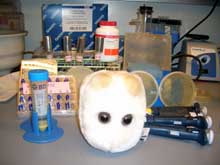Carissa Pardamean L&S Sciences
Neural Tube Defect and Genetic Mutations Coding for Methylenetetrahydrofolate Reductase (MTHFR) Enzyme
This summer, my research involves point mutations in genomic sequences encoding for the enzyme methylenetetrahydrofolate reductase, which is a part of the neural tube formation pathway. The mutations cause spina bifida or neural tube defect (NTD), one of the most common neonatal defects in the US. A common method for NTD prevention is folate (vitamin B9) supplementation but this is not always effective. Thus, my hypothesis is that the success of the folate salvage depends on the type of point mutation that is present in the fetus. Additionally, though NTD is common, there is no universal agreement on the cause; there is a tug-and-war between genetics and environmental factors. Hopefully, this study will shed more light on how much genetics weighs into NTD incidence.
Message To Sponsor
My lab experience has been mostly bench work and data analysis. With SURF, I will have the opportunity to formally write about and present my experimental results, preparing me for the writing of an honors thesis. The cluster meetings let me interact with other brilliant undergraduates, from diverse fields, with various fascinating research topics. I rarely have the opportunity to do so and when I get the chance, it is usually with my advisors. Also this summer I am in the midst of applying to medical schools. The grant that comes with the fellowship allows me to do full-time research and volunteer in a clinical setting, without having to worry about working to pay for rent, bills, and of course, those AMCAS application fees.